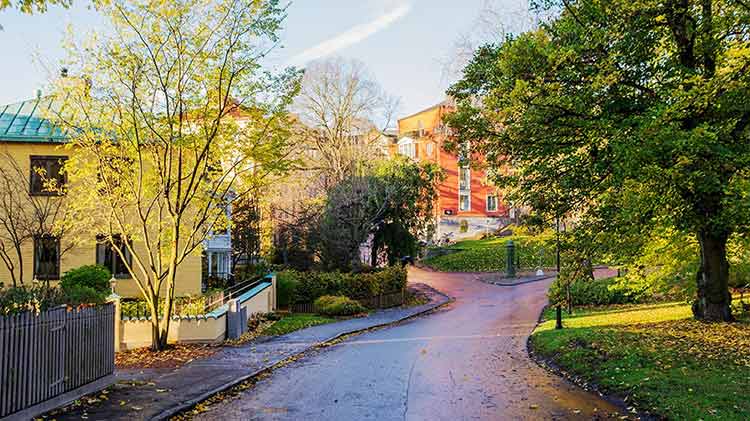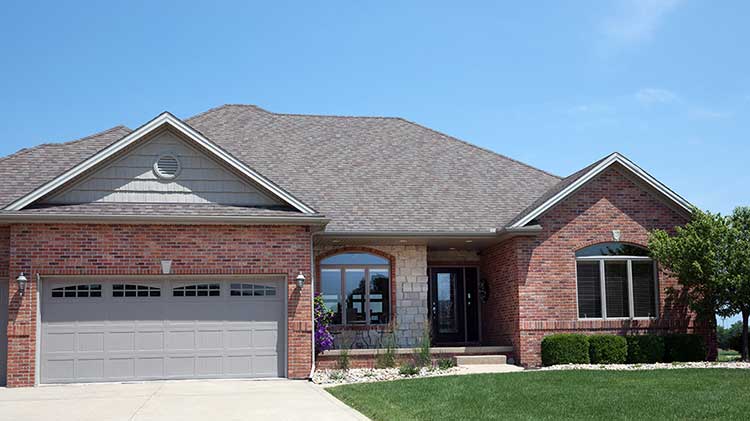Pros and cons of buying a condo
Consider the benefits and drawbacks of purchasing a condominium as you evaluate the right home for you.
Get a unitowners insurance quote
Want to protect your condo?
Thinking about buying a condo? It's important to understand what you might be getting into. Here are some things you may want to consider when deciding if condo living is right for you.
What is a condominium?
A condominium unit, or “condo” unit, is a single unit inside a larger complex of housing units. While occasionally a condo unit can be a stand-alone building in a residential complex, it is more like what you’d think of when you picture an apartment: a single unit, typically with shared walls on one or both sides, possibly above and/or below the unit as well. However, instead of renting an apartment, a condo unit can be purchased. A condo unitowner’s property consists of their individual condo unit and its interior space, as well as a shared interest in the common areas available to all residents in the complex.
Condos vs. apartments, houses and townhomes
Condos are only one option out of many popular living arrangements, each with some distinct differences. So what’s the difference between living in a condo versus an apartment, a house or a townhome? Here are some of the key distinctions:
- Condos vs. apartments – condo units are similar to apartments in that they both exist within a shared complex, but there’s one key difference: ownership. As a condominium unitowner, you will be responsible for paying property tax and a condominium owners association (COA) fee as opposed to an apartment where you only pay rent for the property.
- Condos vs. houses – though both can be purchased, ownership of a condo unit is substantially different from a house. A condo unitowner just owns the interior of their unit as opposed to owning the interior and exterior of a house and its attached plot of land. Additionally, as a condo unitowner, you’ll be expected to join the COA, adhere to its rules and pay any required fees. COAs are responsible for exterior building and communal space maintenance. Some housing neighborhoods also have HOAs, but they are less common and typically just focus on oversight and rule enforcement.
- Condos vs. townhomes – like a condo unit, a townhome generally shares one or two walls with neighboring units. However, unlike a condo unit, the ownership of a townhome more closely resembles the ownership of a house. A condo unitowner’s ownership is limited to the interior of their individual unit whereas the purchase of a townhome includes the exterior and interior of the townhome and the surrounding yard. With that expanded ownership comes expanded responsibility. Both condos and townhomes typically include mandatory association memberships (COA and HOA respectfully), but the COAs duties would include exterior property maintenance which is something townhome owners would be expected to maintain themselves.
What is a COA?
Condo complexes have an attached organization known as the condo owners association — or the COA. This organization is the governing body responsible for decisions regarding the building or complex. Typically, this will consist of a board of officers elected by the owners of the condo units. The officers are usually required to be unit owners living within the condo complex.
The COA board is responsible for conducting meetings, keeping track of the association’s finances (which are used for things like building maintenance and amenities) and making decisions for member issues. COA boards often handle decisions ranging from whether to levy a special assessment for repairs to the implementation of upgrades or features — sometimes required by new laws or ordinances — or whether the complex would benefit from an additional service or specialized coverage such as earthquake insurance.
While typically only the board votes in a COA, there are still open meetings that unit owners can attend to stay informed on building happenings. If you’re new to a condo, attending these meetings can be a great way to start getting familiar with the current affairs of the complex and build relationships with your neighbors! These meetings will usually offer a period for open discussion and questions. Don’t hesitate to ask if there are topics you’d like to know more about regarding the COA.
Pros and cons of buying a condo
Consider the following condo pros and cons before you decide to buy one.
Pros of living in a condo
- Low or no outdoor maintenance – typically, you don't need to worry about things like lawn mowing, cleaning gutters or landscaping.
- Location – when compared to single-family homes, condo units are more often in the middle of the action and close to dining and entertainment.
- Lower cost – condo units may be more affordable than other homes in the same area.
- Amenities – condo complexes can offer different amenities (some charge extra fees), but commonly seen amenities include a gym, pool, parking garage, community rooms, rooftop terrace or pet area. If your building has a pool, you may want to familiarize yourself with water and swimming safety tips before taking a swim.
- Good neighbors – nearby neighbors and shared common spaces make it easy to meet new people and create a sense of community.
- Equity – with the lower cost, condo units can often be purchased sooner than you would be able to buy a single-family house, meaning that you can start building equity in a property earlier.
- Lower insurance premiums – insurance rates for condominiums may cost less than insurance rates for houses, meaning you can help protect your condo while saving each month.
- Security – many condo complexes also offer specific additional security features such as a callbox, security doors and doormen. This feature can be a welcome addition to some buyers.
Cons of living in a condo
- Interest rates – condo unit mortgages may be higher than single-family houses or townhomes, due to the added risk of being part of a shared complex. Loan requirements may be stricter with a condo unit than a house since you and the condo association must meet certain eligibility guidelines.
- Fees – in most condo buildings, there's a required COA fee that covers things like insurance, maintenance in common areas, outdoor maintenance or upkeep on amenities.
- Lack of privacy – to some, the communal aspect of condo living can be a pro, but this is often considered a con: Your neighbors will likely be in close proximity and there’s a good chance you’ll share walls and common spaces, so be prepared for less privacy than in a single-family house.
- Slower appreciation – condos tend to appreciate at a slower rate than single-family homes.
- Rules – condo associations often have all kinds of rules, like quiet hours, pet policies and lawn ornaments, so carefully consider if all of the rules fit your lifestyle.
- No land ownership – buying a condo unit isn’t like buying a house in terms of land ownership. With a house, you also own the land surrounding it. With a condo, your ownership consists of the interior of your condo unit. You do not own the exterior of the unit or the land where it sits.
- Limited storage space – because of their smaller size and lack of potential storage spaces like garages or sheds, storage space is a precious commodity in condo units that can prove difficult for some to live with.
- Limited parking – parking space isn’t always guaranteed with condos. Some condo complexes offer connected parking spaces, but even so, condos offer little in terms of parking compared to a house with a garage and/or driveway.
- Challenges of resale – With the variety of unique considerations and drawbacks to condominiums compared to houses, such as adhering to COA rules and the slower increase in property value, condo unitowners can find it more difficult to find a buyer when they decide to resell.
What is a condo special assessment?
A special assessment is typically a large fee charged to all unitowners to pay for a big project within the condominium complex, like a structural repair to a building or roof replacement. If you’re buying a condo unit, it’s important to know if the COA is planning for a special assessment in the future. An assessment might be added onto your association fees for a set period, or it could be a singular, one-time payment. Regardless of their size, special assessments are a distinct aspect of owning a condo unit and worth evaluating.
What to ask when buying a condo
After looking at the pros and cons of condos, consider asking questions to help you decide if the benefits of condo living are right for you. Wondering what to ask your realtor when buying a condo? Here are some questions you might find helpful to start with:
- Are there COA or condo association fees? If so, how much are they and when are they due?
- What do the fees cover (mowing, landscaping, parking, trash, water etc.)?
- How old is the condo building?
- What amenities are offered?
- Where can I find the association rules?
- How many units are in the building?
- How many units are owner-occupied?
- How many parking spots are assigned to each unit?
- Is there extra storage available?
- Are pets allowed?
- What type of outdoor maintenance (windows/doors) is typically done for each condo unit?
- How are special assessments handled?
- Are there any pending litigations?
- Does the COA have a master insurance policy covering the condominium complex? What property is the condo unitowner responsible for insuring according to the bylaws?
- What is the resale value?
- Is the latest financial report and annual budget available?
- Who is responsible for repairs or maintenance to the condo unit? Under what circumstances is the HOA covering?
Condo living tips
Living in a condo can present some distinct differences compared to living in a single-family home. You may find these tips helpful for maximizing the benefits and minimizing the disadvantages of condo living if you decide to buy one.
- Get to know your neighbors. There’s increased proximity to your neighbors with condo living and shared common spaces. It can be rewarding to build a close-knit community. Consider reaching out, building bridges and being a good neighbor!
- Make use of vertical space. In a condo, space is usually more limited than in a single-family house. This means that making the most of vertical space can pay dividends in your interior design life. Especially useful when making considerations for storage space, but it can also be a useful principle for aesthetic design as well. If cost is a concern, look at our guide for decorating on a budget.
- Keep an eye toward organization. When space is limited, it becomes easier for clutter to accumulate. You may find that being diligent in keeping things tidy and getting items back to where they belong is especially important when managing a condo space. If things are starting to look a little disorganized, you might find a little inspiration with our spring cleaning tips!
- Get involved in your COA. Since a condo complex is primarily managed by the condominium association, getting involved can be a great way to familiarize yourself with the building and neighbors, while protecting your investment. Look into how your COA is structured, including when elections are conducted. Consider joining the residents’ board if you’d like to help make decisions, but at the very least just attending meetings can be helpful for staying informed.
Whenever you're ready to take the next step and buy a condo unit, familiarize yourself with the basics of condo insurance. Also, you can get a condo insurance quote now, or give us a few details and a State Farm® agent will reach out to you.
The information in this article was obtained from various sources not associated with State Farm® (including State Farm Mutual Automobile Insurance Company and its subsidiaries and affiliates). While we believe it to be reliable and accurate, we do not warrant the accuracy or reliability of the information. State Farm is not responsible for, and does not endorse or approve, either implicitly or explicitly, the content of any third-party sites that might be hyperlinked from this page. The information is not intended to replace manuals, instructions or information provided by a manufacturer or the advice of a qualified professional, or to affect coverage under any applicable insurance policy. These suggestions are not a complete list of every loss control measure. State Farm makes no guarantees of results from use of this information.
State Farm Fire and Casualty Company
State Farm General Insurance Company
Bloomington, IL
State Farm Florida Insurance Company
Tallahassee, FL
State Farm Lloyds
Richardson, TX




